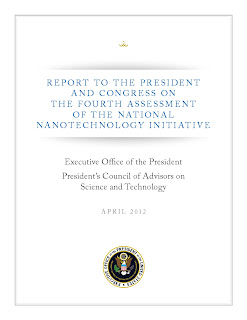by
Today, the President’s Council of Advisors on Science and Technology (PCAST) released its latest assessment of the National Nanotechnology Initiative (NNI): Report to the President and Congress on the Fourth Assessment of the National Nanotechnology Initiative.
 The assessment is a Congressionally mandated biennial review of the NNI, a crosscutting Federal program designed to coordinate U.S. investments in research and development (R&D) activities in nanoscale science, engineering, technology, and related efforts across 26 agencies and programs. It was written by PCAST, acting in its capacity as the National Nanotechnology Advisory Panel.
The assessment is a Congressionally mandated biennial review of the NNI, a crosscutting Federal program designed to coordinate U.S. investments in research and development (R&D) activities in nanoscale science, engineering, technology, and related efforts across 26 agencies and programs. It was written by PCAST, acting in its capacity as the National Nanotechnology Advisory Panel.This year’s assessment focused on the progress made by the NNI and the National Nanotechnology Coordinating Office (NNCO) in fulfilling the recommendations that PCAST made in its 2010 assessment.
PCAST found that the Federal agencies in the NNI have made substantial progress in addressing many of the 2010 recommendations that were aimed at maintaining U.S. leadership in nanotechnology. One of the primary goals of the NNI is to stay ahead of heavily-investing competitors such as China, South Korea, the European Union, and Russia. Overall, PCAST concluded that the NNI remains a successful cooperative venture that is supporting high-quality research, facilitating the translation of discoveries into new commercial products, and ensuring the Nation’s continued global leadership in this important field.
The PCAST assessment particularly commends the expanded efforts of the NNCO in the area of commercialization and coordination with industry, and the NNCO’s release of a focused research strategy for addressing environmental, health, and safety (EHS) implications of nanotechnology. In addition, the assessment recognizes NNI’s strong and growing portfolio of research on the societal implications of nanotechnology, nanotechnology education, and public outreach.
The report makes recommendations (summarized on page vii) for additional progress in the areas of strategic planning, program management, metrics for assessing nanotechnology’s commercial and societal impacts, and increased support for EHS research. It notes, for example, that while the NNI has produced a visionary strategic plan, it remains unclear how agencies will implement the actions suggested in the plan. In the case of program management, it calls for the NNCO to be better supported by the participating agencies given the increasingly important coordinating role that the NNCO plays. In the area of metrics development, it identifies a need to track the development of, and ultimately utilize, metrics for assessing commercial impacts of nanotechnology. And in the area of EHS, the report concludes that cross-agency governance and coordinated research funding is going to be essential as the field of nanotechnology matures.
PCAST is optimistic that with continued efforts to implement these 2012 recommendations, the United States will continue to maintain its global leadership position in nanotechnology with widespread impact on the economy, high-tech jobs, health, national security, energy, and other critical domains.
Maxine Savitz, Ed Penhoet, and Chad Mirkin were co-chairs of the assessment and are members of the President’s Council of Advisors on Science and Technology (PCAST). PCAST is an advisory group of the Nation’s leading scientists and engineers, appointed by the President to augment the science and technology advice available to him from inside the White House and from cabinet departments and other Federal agencies.
Fonte: White House
Fonte: White House
